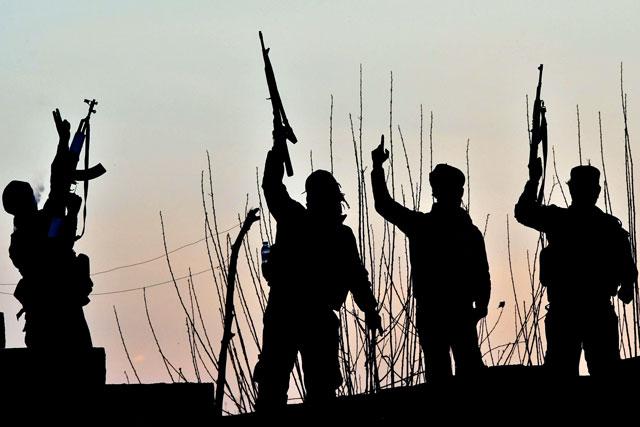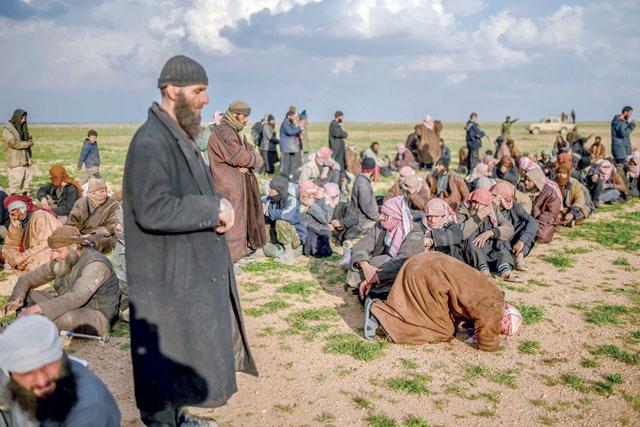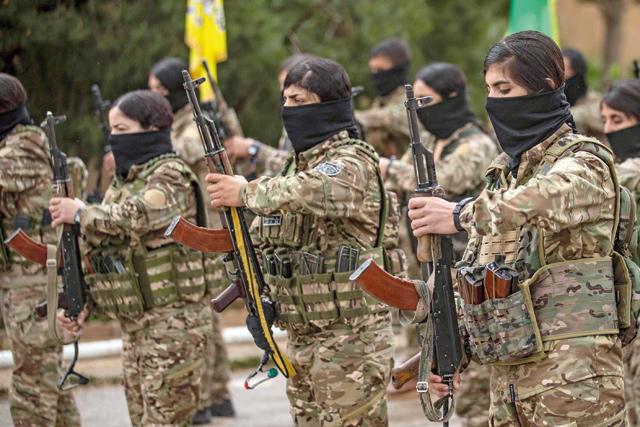You are here
Syria's Kurds call for int'l court to try Daesh extremists
By AFP - Mar 25,2019 - Last updated at Mar 25,2019
AIN ISSA, Syria — Syria's Kurds on Monday called for an international court to be set up in the country to try suspected Daesh group extremists following the announced fall of their "caliphate".
Daesh imposed its brutal interpretation of Islam on millions living in the proto-state that it declared across a large swathe of Syria and neighbouring Iraq in 2014.
The extremists stand accused of carrying out numerous crimes including mass executions, kidnappings and rape.
"We call on the international community to establish a special international tribunal in northeast Syria to prosecute terrorists," the Syria Kurdish administration said.
In this way, "trials can be conducted fairly and in accordance with international law and human rights covenants and charters", it said in a statement.
The Kurdish-led Syrian Democratic Forces on Saturday announced the end of the "caliphate" after defeating Daesh extremists in the eastern village of Baghouz near the Iraqi border.
Kurdish-led forces, backed by a US-led coalition, have detained thousands of suspected Daesh fighters in more than four years battling the militants, including around 1,000 foreigners.
While alleged Daesh fighters are held in jail, women and children suspected of being affiliated to the group are housed in Kurdish-run camps for the displaced.
More than 9,000 foreigners, including over 6,500 children, were held in the main camp of Al Hol, a Kurdish spokesman said, giving the latest figures from a week ago.
‘Not realistic’
The Kurdish administration has repeatedly called for the repatriation of foreign Daesh suspects, and warned it does not have capacity to detain so many people.
But the home countries of suspected Daesh members have been reluctant to take them back, due to potential security risks and a likely public backlash.
“The Kurdish administration in northeast Syria has appealed to the international community to shoulder its responsibilities” with regards to Daesh suspects, it said on Monday.
“But unfortunately there was no response.”
It urged the international community, particularly countries that have nationals detained, to support the establishment of an international tribunal.
A top foreign official for the Kurdish administration said foreign experts could work side by side with local judges.
“They could be foreign judges working with local judges and be experts in crimes committed by terrorist groups,” Abdel Karim Omar told AFP.
Previous international courts include the International Criminal Tribunal for Rwanda which tried genocide perpetrators in the African country.
The International Criminal Tribunal for the former Yugoslavia, meanwhile, tried those accused of genocide, crimes against humanity and war crimes in conflicts that tore apart the Balkans in the 1990s.
Joel Hubrecht, a Paris-based expert in transitional justice expert, said setting up an special tribunal to judge Daesh was a good idea in theory in view of the international dimension of its alleged crimes.
“The idea of an international criminal court is relevant and interesting,” he told AFP.
“But in northeast Syria it’s not realistic.”
The Syrian Kurdish authorities are not internationally recognised, setting up such a tribunal usually takes time, and ensuring witness protection is tough in a war-torn country, he said.
Humanitarian crisis
Despite the declared victory against Daesh in Baghouz, the militants still maintain a presence in the country’s vast desert and have continued to claim deadly attacks in SDF-held territory.
President Bashar Assad’s forces have made a territorial comeback against rebels and militants with key Russian backing since 2015, but the war is far from over.
The battle to end the “caliphate” has triggered an exodus of tens of thousands of people — mainly women and children — out of crumbling Daesh territory, sparked a humanitarian crisis.
The main camp in Al Hol is now bursting at the seams, housing more than 70,000 people — in a place designed for just 20,000.
“Humanitarian conditions in Hol camp are extremely critical,” World Food Programme spokeswoman Marwa Awad said Monday.
At least 140 people — overwhelmingly young children — have died on the way to the camp or shortly after arriving, the International Rescue Committee aid group says.
The Kurdish administration on Monday called on the United Nations to improve living conditions at Al Hol camp.
It particularly called for more humanitarian assistance, expanding the camp, and better water and sewage networks.
Syria’s war has killed more than 370,000 people and displaced millions since starting in 2011 with the brutal repression of anti-government protests.
Apart from fighting Daesh, the Kurds have largely stayed out of the civil war, instead setting up their own semi-autonomous institutions in the northeast of the country.
Related Articles
BAGHOUZ, Syria — US-backed forces battled Daesh group fighters Saturday as the holdout extremists clung to the last dregs of their crumbling
OMAR OIL FIELD, Syria — US-backed Syrian forces warned Sunday they were struggling to cope with an outpouring of foreigners from the Daesh g
AL OMAR, Syria — Daesh forces remain as dangerous today as when they were ousted from their last Syrian bastion two years ago, Kurdish forces warned on Tuesday as they marked the anniversary.


















